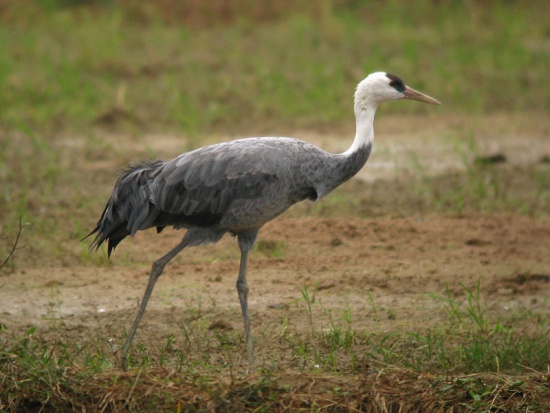Nomdeploom (talk | contribs) |
(Flight photo added. Misc info. References) |
||
| Line 1: | Line 1: | ||
| + | [[Image:Hooded_Crane.jpg|thumb|550px|right|Photo by '''Ingo''']] | ||
;[[:Category:Grus|Grus]] monacha | ;[[:Category:Grus|Grus]] monacha | ||
| − | |||
==Identification== | ==Identification== | ||
| − | 1 m | + | 1 m long, wingspan 1.87 m <br /> |
| + | Grey body, top of neck and head white, bare red skin above hazel-yellow eye, legs and toes black. <br /> Sexes alike though male slightly larger. | ||
| − | Juvenile crown | + | '''Juvenile''' crown is covered with black and white feathers during the first year, with some brownish or greyish wash on their body feathers. |
==Distribution== | ==Distribution== | ||
| − | [[Siberia]] | + | [[Image:Hooded crane11.jpg|thumb|350px|right|Photo by {{user|edenwatcher|edenwatcher}}<br />Arasaki, Kyushu, Japan, February 2008]] |
| + | '''Breeds''' [[Siberia]] and Manchuria<br /> | ||
| + | '''Winters''' to southern [[China]], [[Korea]] and [[Japan]] | ||
==Taxonomy== | ==Taxonomy== | ||
| − | A monotypic species. | + | A monotypic species<sup>[[#References|[1]]]</sup>. |
==Habitat== | ==Habitat== | ||
| − | + | Breeds in sphagnum bogs, forested wetlands in mountain valleys. Winters on cultivated rice fields and wetlands. | |
==Behaviour== | ==Behaviour== | ||
| − | Nests are made of damp moss, peat, sedge stalks and leaves, and branches of larch and birch. | + | ====Breeding==== |
| − | + | Nests are made of damp moss, peat, sedge stalks and leaves, and branches of larch and birch. Two eggs are laid and incubated by both parents for 27-30 days. | |
| − | Diet includes aquatic plants, berries, insects, frogs, salamanders, roots, rhizomes, seeds, grass, and small animals. | + | ====Diet==== |
| + | Diet includes aquatic plants, berries, insects, frogs, salamanders, roots, rhizomes, seeds, grass, and small animals. | ||
| + | ==References== | ||
| + | #{{Ref-Clements6thDec08}}#Wikipedia | ||
| + | #International Crane Foundation | ||
| + | #BF Member observations | ||
| + | {{ref}} | ||
==External Links== | ==External Links== | ||
{{GSearch|Grus+monacha}} | {{GSearch|Grus+monacha}} | ||
[[Category:Birds]] [[Category:Grus]] | [[Category:Birds]] [[Category:Grus]] | ||
Revision as of 11:50, 15 July 2009
- Grus monacha
Identification
1 m long, wingspan 1.87 m
Grey body, top of neck and head white, bare red skin above hazel-yellow eye, legs and toes black.
Sexes alike though male slightly larger.
Juvenile crown is covered with black and white feathers during the first year, with some brownish or greyish wash on their body feathers.
Distribution
Breeds Siberia and Manchuria
Winters to southern China, Korea and Japan
Taxonomy
A monotypic species[1].
Habitat
Breeds in sphagnum bogs, forested wetlands in mountain valleys. Winters on cultivated rice fields and wetlands.
Behaviour
Breeding
Nests are made of damp moss, peat, sedge stalks and leaves, and branches of larch and birch. Two eggs are laid and incubated by both parents for 27-30 days.
Diet
Diet includes aquatic plants, berries, insects, frogs, salamanders, roots, rhizomes, seeds, grass, and small animals.
References
- Clements, JF. 2008. The Clements Checklist of Birds of the World. 6th ed., with updates to December 2008. Ithaca: Cornell Univ. Press. ISBN 978-0801445019.
- Wikipedia
- International Crane Foundation
- BF Member observations
Recommended Citation
- BirdForum Opus contributors. (2024) Hooded Crane. In: BirdForum, the forum for wild birds and birding. Retrieved 21 May 2024 from https://www.birdforum.net/opus/Hooded_Crane





